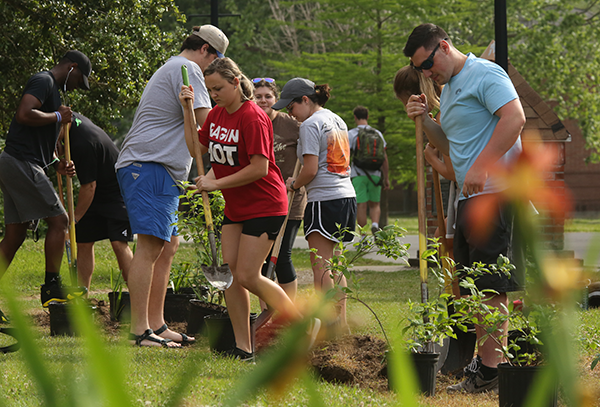Sustainability efforts at the University of Louisiana at Lafayette are being noticed from a distance of more than 10,000 miles.
UL Lafayette is 195th on the 2018 University of Indonesia’s GreenMetric Rankings released recently. UL Lafayette is No. 25 in the United States.
Eco-friendly practices and overall campus environment were considered at 719 universities from 81 countries for UI’s GreenMetric list. It relies on data collected via online questionnaires submitted by each university.
The system is the only one in the world that measures green efforts at universities, according to a press release from the University of Indonesia.
Wageningen University & Research, the Netherlands is the world’s eco-friendliest university. The University of Nottingham, United Kingdom is second, followed by the University of California, Davis. The University of Oxford and Nottingham Trent University, both in the United Kingdom, are fourth and fifth, respectively.
The GreenMetric list is based on factors such as recycling, efficient use of electricity, renewable energy sources and amount of open space, forest and vegetation on campus.
Gretchen Lacombe Vanicor, director of UL Lafayette’s Office of Sustainability, said the University’s commitment to sustainability stretches beyond “enacting programs to reduce waste on campus or planting trees or using environmentally-sound construction practices.”
“Eco-friendly practices and programs benefit the campus and community, but also offer opportunities for education and research,” she said.
The University’s $5 million Photovoltaic Applied Research and Testing Laboratory, for example, provides students with training related to alternative energy that reduces fossil-fueled energy consumption and offsets air emissions like sulfur dioxide, nitrous oxide and greenhouse gases.
Vanicor cited The University’s “zero-waste” program as an opportunity for students to earn service hours. Bins placed at Cajun Field during football games give fans the option of having their game day trash composted or recycled.
“Students who participate in the program steer fans toward the proper bins and answer questions about the process,” Vanicor explained.
UL Lafayette has enacted a range of other programs over the last several years, she added, and has earned ample recognition for those efforts. A sampling is below.
- The U.S. Department of Education selected the University as one of only 11 postsecondary Green Ribbon Schools in the nation and the only one in Louisiana. The designation acknowledges “leadership in reducing environmental impact, improving health, and teaching environmental education.”
- The National Wildlife Federation praised Cypress Lake for its role in protecting wildlife and providing a learning environment for students. The managed wetland on campus is home to alligators, several species of turtles and fish, and hawks, herons and other birds.
- The University earned its ninth consecutive Tree Campus USA title last year from the Arbor Day Foundation. The campus has more than 2,000 trees and large shrubs. One tree – a rare Montezuma bald cypress that’s one of the largest in the state – is listed on the Louisiana Forestry Association’s Directory of Champions.
- The Student Union was recognized by the U.S. Green Building Council’s LEED program for environmentally-sound building practices and recycling efforts during its expansion and renovation. The classification is based on factors such as types of materials used and recycling of debris produced during demolition of most of the original structure.
Beyond existing programs, the GreenMetric rankings measure an institution’s ongoing commitment to expanding its eco-friendly practices. The University’s 60-page Sustainability Strategic Plan was issued in July.
Learn more about University eco-friendly efforts at the Office of Sustainability.
